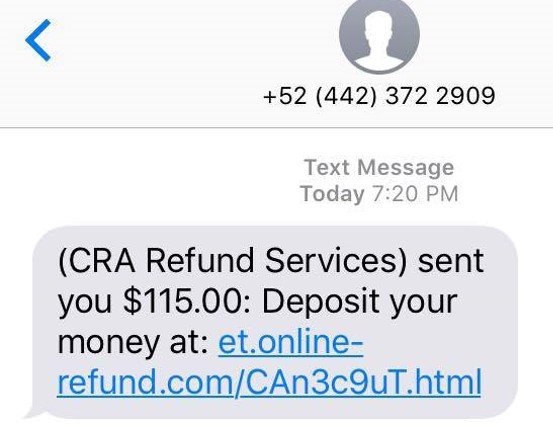Tax scams have been a never-ending issue for many tax authorities, including the Canada Revenue Agency (CRA). The CRA has been warning the public of a recent scam involving email and text message money transfers. The text and/or e-mail asks the person to click on a link to deposit their income tax return or direct deposit their refund to their desired account. The CRA text message scam looks something like this.

Remember that none of this is real, and avoid clicking on any provided links in these text messages, and e-mails.
Canadian Tax Scams
In the recent times, Canadian taxpayers have been receiving text messages and e-mails stating to be from Interac, and calls routed via government and police contact numbers. These forms of communications usually include a website link, and requests taxpayers to click on the link to provide details of their bank account to make a transfer of their tax refund, or request taxpayers to update their tax-related personal information, such as a social insurance, credit card, bank account, and passport numbers, from the taxpayer.
Note that the website looks formal just like a webpage from the CRA’s website or a bank’s webpage. However, on entering any information, the taxpayer’s information will be at the scammer’s disposal. These scammers could use it for wrong purposes and ruin the taxpayer’s credit score, and lead to significant debt.
Taxpayers should never respond to these communications. No matter what the situation, always refrain from divulging personal information over calls or unknown e-mails, or making immediate payments due to the fear of imprisonment or other threats over the call or mail.
CRA’s Method of Communication
Be aware that if the CRA wishes to contact a taxpayer, they will issue notice and letters, which will be mailed to the taxpayer’s address provided on their Canadian tax return. Details of this notice/letter will also be available on the taxpayer’s tax account ‘MyCRA’ webpage.
Considering the current digital times, the CRA has recently started sending out e-mails to those taxpayers who have subscribed for CRA e-mail updates. Even in this case, the CRA will provide no outside/third party links to click and update any information.
The CRA e-mail will look something like this:
“You are getting this email because you registered to receive some correspondence from the Canada Revenue Agency (CRA) online instead of on paper in the mail.
Dear Taxpayer,
You have new online mail from the CRA.
To view your online mail, please log in to My Account and select “View mail”. You must be registered for My Account to access your online mail. Not registered for My Account or having difficulty logging in? Please visit the CRA website.
Please note this is official correspondence from the CRA which may require attention.
If you are an authorized representative, you can view online mail by logging in to Represent a Client.
Thank you for registering for the CRA’s online mail service.”
Note that the CRA will never:
- Request personal or financial information of any kind from a taxpayer by e-mail.
- Divulge taxpayer information to another person unless formal authorization is provided by the taxpayer.
- Leave any personal information on an answering machine.
Also, as mentioned in our earlier Canadian Vancouver Police Department (VPD) Tax Scam article, when a taxpayer receives such calls, text, or e-mails, they should always ask themselves these questions:
- Am I expecting additional money from the CRA?
- Does this sound too good to be true?
- Is the requester asking for information I would not include with my tax return?
- Is the requester asking for information I know the CRA already has on file for me?
- How did the requester get my email address?
- Am I confident I know who is asking for the information?
Taxpayers should stay alert, and keep the steps to identify tax scams in mind. Being informed is one step to avoid falling prey to tax scams.
Furthermore, taxpayers can always reach out to the CRA if they have faced any other form of tax fraud or doubt a text message, e-mail, or phone call that they have received. Report any tax scam faced to the Canadian Anti-Fraud Centre or call the toll free number 1-888-495-8501. This number can also be used to find out about on-going tax scams. Do not forget to reach out the police as well.
AG TAX LLP CAN HELP
If you have any other tax-related queries, and/or need assistance with tax planning/filing please contact AG Tax. Our tax professionals are highly-experienced with U.S. and Canadian tax laws and can provide you the right guidance to handle your tax situation.
Aylett Grant Tax LLP is a full service accounting firm with a dedicated team of experts, who are highly-qualified and experienced in handling situations related to U.S., Canada and other international tax laws.
We can assist with:
- Canadian Personal and corporate tax returns
- Cross Border Taxation and Business Planning
- Personal and Corporate Taxation
- Disclosure of Foreign Assets and other information filings
- Retirement planning
- Estate Planning, Inheritance tax advice
To obtain a quote or to arrange for a consultation to discuss your tax related queries, please contact us at:
- 604-538-8735 (Greater Vancouver Area, BC)
- 780-702-2732 (Greater Edmonton Area, AB)
Disclaimer: The information in this publication is accurate as of the time of its publication. AG Tax assumes no responsibility for changes to tax legislation subsequent to the publication of this document. The information provided is for general information purposes only and should not be acted upon without seeking professional advice. If you would like to engage our services, please contact our staff and obtain authorization to send our firm confidential information. A client relationship is not created by the transmission of information. A client relationship is only formed with our firm when a scope and engagement letter signed by the firm and the potential client detailing the terms of engagement is present.

